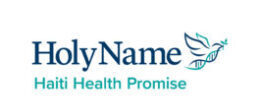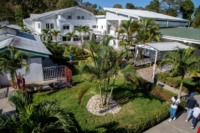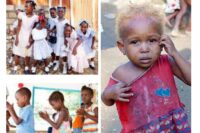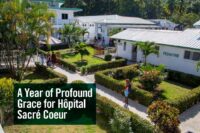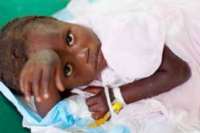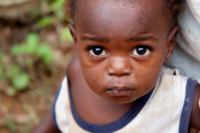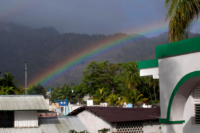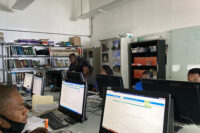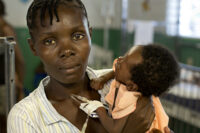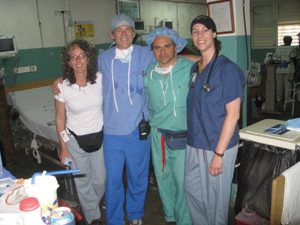 By Harry Sax, M.D.
By Harry Sax, M.D.
Wednesday, January 5, 2011
Ed Constantine paused for a moment as he taxied the Beech Baron into position on Runway 5 at Boca Raton Airport. “At this point, I always pray.” I nodded and bowed my head as he quietly crossed himself. He looked up, advanced the throttles and we rolled toward the light of the rising sun.
I made the call outs- “Airspeed alive; rotate; positive rate; gear up.” There was nothing wrong with the airplane that required prayer to urge it skyward. While most people would be a bit shaken by a pilot praying immediately before takeoff, I wasn’t surprised.
Ed Constantine feels blessed and reminds himself of that daily. Today’s flight is his way of giving back for his successes, and fulfilling a calling.
The morning of the flight was the first time we had met face to face. Introduced initially through emails and CRUDEM, we shared stories of flying and he brought Tania and her mother from Cap Haitian to the States for her subsequent treatment at Hopkins. We discussed the medical issues related to bringing her in a nonpressurized aircraft and calculated weights and balance so that a fuel stop would not be needed in another foreign country. He safely delivered her to Florida last fall. I later found out he would do even more.
Before we met, my image of Ed was that of a retired business man, likely in his 60’s, flying a 25 year old plane that he used for pleasure and occasional philanthropy. That morning at the FBO was a young athletic man, and his airplane was a recent model G58. As we loaded the computer equipment, he mentioned falling off a ladder several years ago and breaking his back.
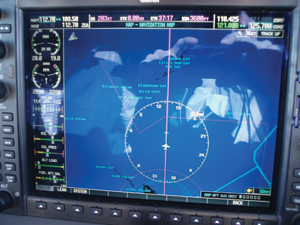 There were recommendations for multiple surgeries that would have significantly reduced mobility. He was fortunate the night of the injury that an orthopedic resident doing a spine fellowship was moonlighting and immediately placed him in a brace that stabilized the bones. His spinal cord was intact. There was a period of time before he would have to undergo surgery. He spent those weeks thinking about his life and realizing not everything was in his control. Over time, the bones realigned and the fragment in his canal reduced.
There were recommendations for multiple surgeries that would have significantly reduced mobility. He was fortunate the night of the injury that an orthopedic resident doing a spine fellowship was moonlighting and immediately placed him in a brace that stabilized the bones. His spinal cord was intact. There was a period of time before he would have to undergo surgery. He spent those weeks thinking about his life and realizing not everything was in his control. Over time, the bones realigned and the fragment in his canal reduced.
He admitted that he felt the power of faith.
Subsequently, he and his wife devoted themselves to family and his church. He is an engineer and had started a consulting business looking at operational improvements in process. Through hard work and some luck, the business was bought, giving him a moderate windfall. What did they do with the money? They set up a charitable foundation, and were able to purchase the plane, to be used for trips like today.
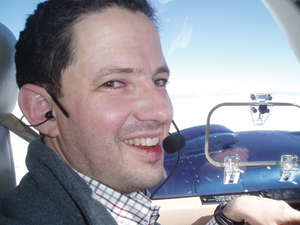 We leveled off at 11,000 feet and the broken cloud deck below cast shadows on the water that looked like islands. I realized we were in the Bermuda triangle and could see how early sailors and pilots could easily be confused. The conversations flowed easily and we discussed the differences and similarities in our religions. There were clearly some significant differences in beliefs around certain subjects – they were mentioned and tucked away. At one point I could only see water and subconsciously checked the fuel flows and cylinder head temperatures.
We leveled off at 11,000 feet and the broken cloud deck below cast shadows on the water that looked like islands. I realized we were in the Bermuda triangle and could see how early sailors and pilots could easily be confused. The conversations flowed easily and we discussed the differences and similarities in our religions. There were clearly some significant differences in beliefs around certain subjects – they were mentioned and tucked away. At one point I could only see water and subconsciously checked the fuel flows and cylinder head temperatures.
We pilots think that engines know when you’re away from land and purposely run a little rough, just so you know who really in charge…
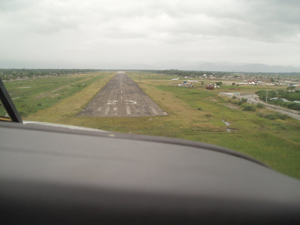 Miami lost radar contact and we were back to giving position reports like the pilots of the 30’s and 40’s. Soon we picked up the beacon for Provo, in Turks where we’d refuel and head for Cap. The Haitian ATC system is quite rudimentary. We broke out of the clouds for the runway 23, only to see a plane ahead on us back taxiing where we were to land.
Miami lost radar contact and we were back to giving position reports like the pilots of the 30’s and 40’s. Soon we picked up the beacon for Provo, in Turks where we’d refuel and head for Cap. The Haitian ATC system is quite rudimentary. We broke out of the clouds for the runway 23, only to see a plane ahead on us back taxiing where we were to land.
A quick 360 degree turn to the right bought us some time, and the landing was safe, given the runway condition and potholes. He dropped me off, and picked up some volunteers heading back to the States. I stood outside to watch him disappear back into the mist.
We exchanged a couple of emails and Holiday greetings. Then I got a note sent to the team of volunteers who helped with Tania.
Tania made it to Hopkins and received wonderful care. Her father and relatives were able to see her in Baltimore, and her mother and cousins stayed across the street.
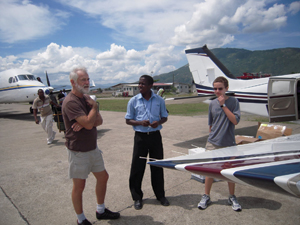 Unfortunately the disease progressed rapidly, despite therapy. She died just before Christmas at age 24.
Unfortunately the disease progressed rapidly, despite therapy. She died just before Christmas at age 24.
Her family was too poor to return her body to Haiti, and we were trying to work out the logistics. However, she was cremated in Baltimore and her mother went back to New Jersey with family. They asked Hopkins to dispose of the remains. Ed had met Tania and her mother for only a few hours, but felt that she needed a final resting place.
This Monday a funeral mass will be held at St. Joan of Arc church in Boca Raton Florida, followed by interment at the cemetery. All arrangements were carried out by Ed and his family. Tania’s parents will be there.
And the next time I see sunlight reflecting off a Baron, I will pause and be grateful that the world has people like Ed. And now that I think about it maybe it’s better as a pilot to say your own private prayers, than to look over at your passengers and see them fervently praying for their survival.
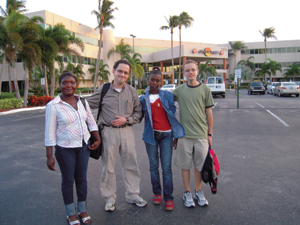 * This article appeared in the online blog Harry at Sacré Coeur and is reprinted with permission. We encourage you to visit Dr. Sax’s exceptional blog at: http://harryatsacrecoeur.blogspot.com/.
* This article appeared in the online blog Harry at Sacré Coeur and is reprinted with permission. We encourage you to visit Dr. Sax’s exceptional blog at: http://harryatsacrecoeur.blogspot.com/.
Harry Sax, M.D. is Vice Chair of Surgery, Physician Liaison Cedars Medicine at Cedars-Sinai Medical Center. Dr. Sax received his MD from Johns Hopkins University School of Medicine and received additional training at University of Cincinnati College of Medicine and University of Rochester School of Medicine & Dentistry. He is a graduate of the Health Care Management Program at Harvard University School of Public Health. D. Sax served at HSC for 3 weeks in March, 2010 and returned twice more in 2010. Dr. Sax will volunteer again in June, 2010.
